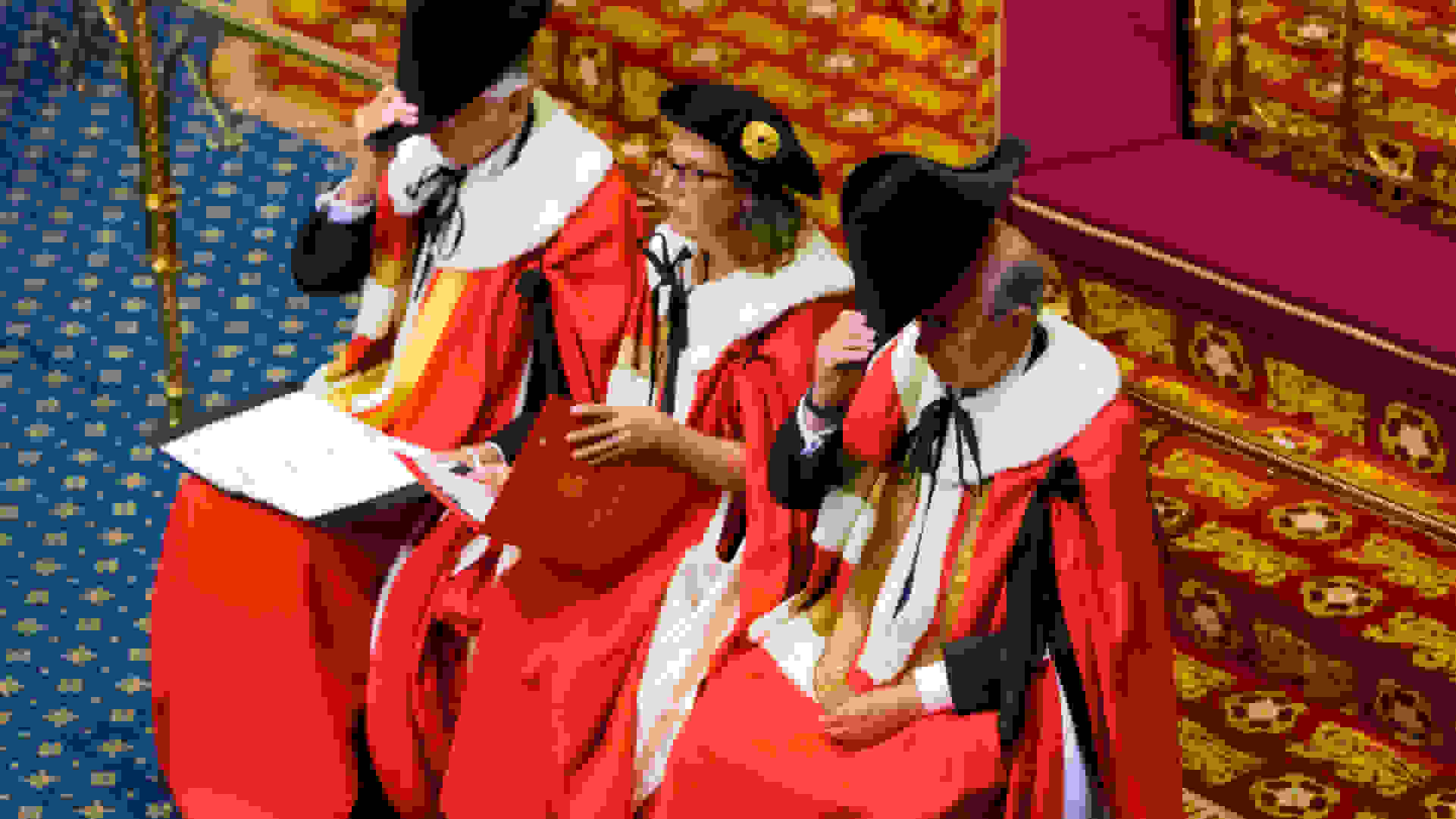"... as if the Commissioners had walked into Parliament with a blank sheet of paper": Parliament's procedural handling of the Supreme Court's nullification of prorogation
Mon. 7 Oct 2019
The Supreme Court's 24 September nullification of the prorogation that had at that point been underway presented Parliament with a procedural and record-keeping problem. Here, the Clerks of the Journals in the two Houses explain how it was resolved.


, Clerks of the Journals, House of Lords
Chloe Mawson and Kate Lawrence
Chloe Mawson and Kate Lawrence
Clerks of the Journals, House of Lords
, Clerk of the Journals, House of Commons
Mark Hutton
Mark Hutton
Clerk of the Journals, House of Commons
Get our latest research, insights and events delivered to your inbox
Share this and support our work
The Supreme Court's decision on 24 September that Parliament had not been prorogued required some thought to be given to what, then, in procedural terms had occurred on the evening of Monday 9 September.
The Court decided that since the advice to prorogue Parliament was unlawful, the consequent Order in Council was unlawful and should be quashed, and the actual prorogation, as declared by the Lords Commissioners in the House of Lords on that evening, was itself "unlawful, null and of no effect" (paragraph 69).
The Court was able to make the final part of this determination because it had earlier satisfied itself that, although prorogation took place in the House of Lords, "it cannot sensibly be described as a 'proceeding in Parliament'" (paragraph 68). This was because it was something done to, not by, Parliament. If the Court had concluded that prorogation was a proceeding in Parliament, it would have been barred from questioning or impeaching its legitimacy by Article 9 of the Bill of Rights.
The effect of the Supreme Court's decision was to make the prorogation activities which took place in the House of Lords on 9 September null and void.
The activities that were quashed included the Royal Assent of the Parliamentary Buildings (Restoration and Renewal) Bill, because the Queen had signified Royal Assent to that Bill in the same Letters Patent that commissioned Prorogation. On 25 September, the Lord Speaker informed the House of Lords that the Clerk of the Parliaments would therefore "delete the following items of business from the minutes of proceedings of 9 September: Royal Commission, Royal Assent, Queen's Speech and Prorogation".
If those items are deleted – if they in effect never happened – then the message from Black Rod that the Lords Commissioners requested the attendance of the Commons in the Lords and the consequent attendance could not be properly constituted proceedings of the House of Commons. The last proceeding in the Commons was therefore the suspension of the House which routinely occurs when a prorogation is expected.
Suspension is defined in Erskine May's Parliamentary Practice as "a temporary break in a sitting ... which ends with the resumption of the current sitting" (paragraph 17.15). It is thus not a state in which the Commons can continue to be for any prolonged period. Doorkeepers, attendants and others remain on duty, and access to the Chamber is restricted in the same way as during a sitting. When the House is suspended, the Mace remains on the Table as an indication of that fact.
But, after the suspension on 9 September, neither of these things happened:
The Chamber was open to the public the following day.
The Mace accompanied the Speaker to the Lords and, as is usual at a prorogation, did not return to the Commons Chamber.
Normally, the House of Commons can be adjourned only by the passing of a motion to that effect. It is the regular use of such a motion which permits the regular end-of-day 'adjournment' debate.
But the House can adjourn without a motion, as – for example – in cases of grave disorder under the provisions of Standing Order No. 46.
The House of Commons was not prorogued (the Supreme Court had determined that). It was not suspended (because suspensions cannot continue indefinitely, access to the Chamber was not restricted and the Mace was not on the Table). It could only be adjourned. That adjournment derived from the reality of the situation and the terms of the House's own Standing Orders, which set and limit its sitting times.
In the Lords, the last business before the prorogation proceedings was the reception of a message from the Commons that they had agreed to amendments to the Parliamentary Buildings (Restoration and Renewal) Bill. As with the Commons, there had been no motion put to adjourn the House and therefore – with prorogation struck down – the House was in limbo.
In both Houses the respective Speaker instructed that their Houses be recorded as adjourned. These announcements did not cause the adjournments, but were intended to provide clarity and certainty as to Parliament's interpretation of consequences of the Supreme Court's decision. In particular, they set out the basis on which the calculations of certain statutory periods relating to secondary legislation and to treaties have been made.
But what of the record of what happened in both Houses? As noted above, what had occurred could not be considered to be properly constituted proceedings.
In the House of Commons, the decision was taken that they should not have been recorded in the Votes and Proceedings. For that reason the Speaker in his statement on 25 September instructed that they should be "expunged" – an old-fashioned but well-precedented term which conveys an appropriate and reassuring finality. If you look at the Votes and Proceedings of Monday 9 September on the Parliament website, you will see that they have been corrected in consequence of the Speaker's statement. There is no record of the 'prorogation', just the statement that the House adjourned.
In the House of Lords, the Lord Speaker instructed that the 'prorogation' event recorded in the Minutes of Proceedings should be "disregarded". The record of prorogation proceedings will remain in the Journals of the House but next to those entries will appear a correction reflecting the Lords Speaker's statement. This should help future historians understand what actually happened.
But what about the other records of proceedings such as Hansard? The Hansards of the two Houses are not a procedural record of events, and all the proceedings of 9 September in both the Commons and the Lords are still recorded without comment. The Hansards of both Houses for 25 September start with the words of the two Speakers explaining the effect of the Supreme Court judgement.
Banner image: 'Prorogation in the House of Lords', by UK Parliament (CC BY-NC 2.0).
More
Related
Blog / "Will they come when you do call for them?": Should select committees have real power to compel evidence?
In a recent report the House of Commons Privileges Committee recommended the creation of a new criminal offence to deal with the rare problem of recalcitrant select committee witnesses. The proposal is narrow and looks workable. However, it remains controversial, and the Committee has invited further views, with final proposals expected later in 2021.
Guides / What happens on the day of the Queen's Speech and State Opening of Parliament?
The State Opening of Parliament, with the Queen's Speech at its centre, is the largest and most elaborate ceremonial occasion in the regular parliamentary calendar. The ceremony is rich in history and constitutional symbolism, and is also of immediate political interest and importance.
Blog / "... as if the Commissioners had walked into Parliament with a blank sheet of paper": Parliament's procedural handling of the Supreme Court's nullification of prorogation
The Supreme Court's 24 September nullification of the prorogation that had at that point been underway presented Parliament with a procedural and record-keeping problem. Here, the Clerks of the Journals in the two Houses explain how it was resolved.
Blog / The 2019 Liaison Committee report on the Commons select committee system: broadening the church, integrating with the Chamber
In its recent landmark report, the House of Commons Liaison Committee recommended a widening of the circle of those that select committees should hold to account, and a turn towards the public in all committee activity, but also tighter links between select committees and the House of Commons Chamber.
Blog / The Independent Group of MPs: will they have disproportionate influence in the House of Commons?
The roles occupied by members of The Independent Group - particularly on select committees, where they retain a number of important posts and command two and a half times as many seats as the Liberal Democrats – could give them more influence than their small, non-party status might normally be expected to accord them.
Blog / The DCMS Committee, Facebook and parliamentary powers and privilege
For its 'fake news' inquiry the House of Commons DCMS Committee has reportedly acquired papers related to a US court case involving Facebook. Andrew Kennon, former Commons Clerk of Committees, says the incident shows how the House's powers to obtain evidence do work, but that it might also weaken the case for Parliament's necessary powers in the long term.
Publications / Opening up the Usual Channels: next steps for reform of the House of Commons
In a speech to the Hansard Society on 11 October 2017, of which the full text and audio recording are below, the House of Commons Speaker, the Rt Hon John Bercow MP, proposed three key reforms for the House: a House Business Committee; reforms to procedures for Private Members' Bills; and a loosening of the government's exclusive control over recalling the House.
Blog / Corbyn's 'Save Our Steel' e-petition shows why the rules governing the recall of Parliament need to change
In a time of crisis Parliament is hamstrung if it is in recess. MPs are not masters of their own House because, in accordance with House of Commons Standing Order 13, only government ministers - in reality the Prime Minister - can request a recall of Parliament.
Reports / Measured or Makeshift? Parliamentary Scrutiny of the European Union
In this 2013 pamphlet, leading politicians, commentators and academics set out growing concerns that parliamentary scrutiny of EU business at Westminster was inadequate, questioned whether there was a democratic deficit at the heart of the UK's relationship with the EU, and canvassed ideas for reform of Parliament's EU engagement.
Reports / Opening Up The Usual Channels
This 2002 report lays bare the operation of one of the most distinctive, mysterious and critical features of the Westminster Parliament: the 'usual channels' - that is, the relationships between the government and opposition parties through which Parliament's business is organised.
Latest
Guides / Financial Scrutiny: the Budget
In order to raise income, the government needs to obtain approval from Parliament for its taxation plans. The Budget process is the means by which the House of Commons considers the government’s plans to impose 'charges on the people' and its assessment of the wider state of the economy.
Guides / Financial Scrutiny: the Estimates Cycle
In order to incur expenditure the government needs to obtain approval from Parliament for its departmental spending plans. The annual Estimates cycle is the means by which the House of Commons controls the government’s plans for the spending of money raised through taxation.
Data / Coronavirus Statutory Instruments Dashboard
The national effort to tackle the Coronavirus health emergency has resulted in UK ministers being granted some of the broadest legislative powers ever seen in peacetime. This Dashboard highlights key facts and figures about the Statutory Instruments (SIs) being produced using these powers in the Coronavirus Act 2020 and other Acts of Parliament.
Briefings / The Economic Crime (Transparency and Enforcement) Bill: four delegated powers that should be amended to improve future accountability to Parliament
The Bill seeks to crack down on ‘dirty money’ and corrupt elites in the UK and is being expedited through Parliament following Russia’s invasion of Ukraine. This briefing identifies four delegated powers in the Bill that should be amended to ensure future accountability to Parliament.
Articles / Brexit and Beyond: Delegated Legislation
The end of the transition period is likely to expose even more fully the scope of the policy-making that the government can carry out via Statutory Instruments, as it uses its new powers to develop post-Brexit law. However, there are few signs yet of a wish to reform delegated legislation scrutiny, on the part of government or the necessary coalition of MPs.